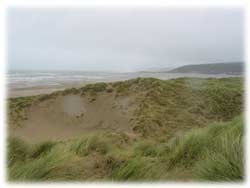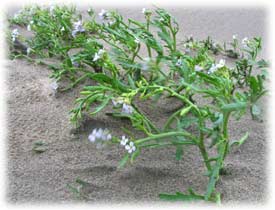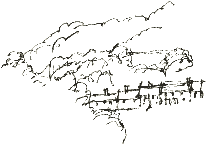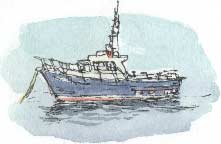
The Dunes at Ynyslas |
Richard Bell's Wild West Yorkshire nature diary, Friday 21st September, 2007 |


 MARRAM
GRASS and sea rocket (right) are amongst the first
plants to get a foothold on the shifting sands of coastal dunes. Sea rocket
has fleshy leaves for water retention while the marram has inrolled
leaves which protect the stomata from excessive evaporation.
MARRAM
GRASS and sea rocket (right) are amongst the first
plants to get a foothold on the shifting sands of coastal dunes. Sea rocket
has fleshy leaves for water retention while the marram has inrolled
leaves which protect the stomata from excessive evaporation.
We have no problems with dessication this morning: we get soaked in a squall that comes in from the Irish Sea as we walk around the headland. Fortunately there’s a visitor centre to shelter in and a café that does bacon barms* on the caravan site just down the road.
*A barm in Lancashire is a breadcake; what we in Yorkshire would call a teacake (in Lancashire a teacake is a breadcake with raisins, but that's a fruit teacake on our side of the Pennines). The couple who run the café are from Manchester.
|
|

 Llangollen
LlangollenUnfortunately that was the end of our short stay in Wales but we hope to be back again before too long. On the return journey the following day we stopped to drink our flask of coffee overlooking Lake Bala then called at one of our favourite small Welsh towns, Llangollen (left). There's an attractive riverside walk here which is new since we last explored the town, which shows how long it is since we visited. We like the canal-side walk here too which we once followed along the valley as far as Telford's aqueduct.
The perfect lunch for our final day in Wales was Welsh
Rarebit to the chef's secret recipe (which definitely included a good sprinkling of
Worcester sauce) at the Royal Hotel overlooking the rapids below the old bridge. The
river here was brown and frothy like beer.